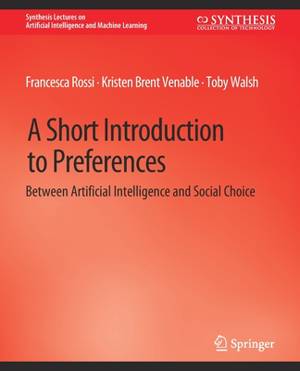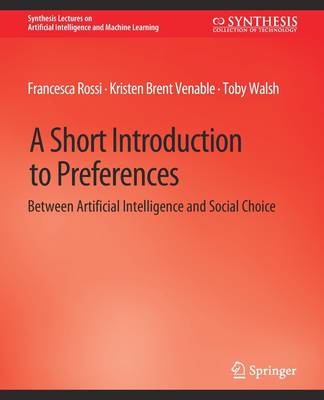
- Afhalen na 1 uur in een winkel met voorraad
- Gratis thuislevering in België vanaf € 30
- Ruim aanbod met 7 miljoen producten
- Afhalen na 1 uur in een winkel met voorraad
- Gratis thuislevering in België vanaf € 30
- Ruim aanbod met 7 miljoen producten
Zoeken
A Short Introduction to Preferences
Between AI and Social Choice
Francesca Rossi, Kristen Brent Venable, Toby Walsh
€ 29,95
+ 59 punten
Omschrijving
Computational social choice is an expanding field that merges classical topics like economics and voting theory with more modern topics like artificial intelligence, multiagent systems, and computational complexity. This book provides a concise introduction to the main research lines in this field, covering aspects such as preference modelling, uncertainty reasoning, social choice, stable matching, and computational aspects of preference aggregation and manipulation. The book is centered around the notion of preference reasoning, both in the single-agent and the multi-agent setting. It presents the main approaches to modeling and reasoning with preferences, with particular attention to two popular and powerful formalisms, soft constraints and CP-nets. The authors consider preference elicitation and various forms of uncertainty in soft constraints. They review the most relevant results in voting, with special attention to computational social choice. Finally, the book considers preferences in matching problems. The book is intended for students and researchers who may be interested in an introduction to preference reasoning and multi-agent preference aggregation, and who want to know the basic notions and results in computational social choice. Table of Contents: Introduction / Preference Modeling and Reasoning / Uncertainty in Preference Reasoning / Aggregating Preferences / Stable Marriage Problems
Specificaties
Betrokkenen
- Auteur(s):
- Uitgeverij:
Inhoud
- Aantal bladzijden:
- 90
- Taal:
- Engels
- Reeks:
Eigenschappen
- Productcode (EAN):
- 9783031004285
- Verschijningsdatum:
- 25/07/2011
- Uitvoering:
- Paperback
- Formaat:
- Trade paperback (VS)
- Afmetingen:
- 190 mm x 235 mm
- Gewicht:
- 195 g

Alleen bij Standaard Boekhandel
+ 59 punten op je klantenkaart van Standaard Boekhandel
Beoordelingen
We publiceren alleen reviews die voldoen aan de voorwaarden voor reviews. Bekijk onze voorwaarden voor reviews.







